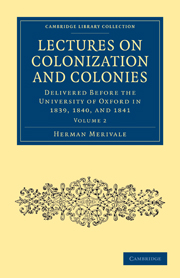 Lectures on Colonization and Colonies
Lectures on Colonization and Colonies Summary
Let us proceed to investigate very briefly the causes and character of the economical progress of colonies in what may be called their second or adolescent stage, when they are already established as communities, and before they have attained that density of population which characterizes old states.
I need not repeat what has been so often urged in these lectures, that the cause which impels adventurers to the foundation of new colonies, and the reward of the exertions of the emigrant, is the increased productiveness of labour when applied to a new soil. The labour of every man in the colonies, said Sir Josiah Child in the early days of our American plantations, is four times as valuable as if he had remained at home. The industry of those who go into a foreign plantation, says William Penn, is worth more than if they remained here, “the product of their labour being in “commodities of a superior nature to those of this “country;” that is, greater either in amount or value. According to a calculation of Humboldt, the return of wheat in Prussia in his time might be estimated at 4 or 5 to 1; in France, on the average, at 5 or 6 to 1; in the best soils, 13 to 1; in La Plata, 12 to 1; the North of Mexico, 17 to 1; Peru, 18 to 1: equinoxial Mexico, 24 to 1.
- Type
- Chapter
- Information
- Lectures on Colonization and ColoniesDelivered before the University of Oxford in 1839, 1840, and 1841, pp. 224 - 246Publisher: Cambridge University PressPrint publication year: 2010First published in: 1842
